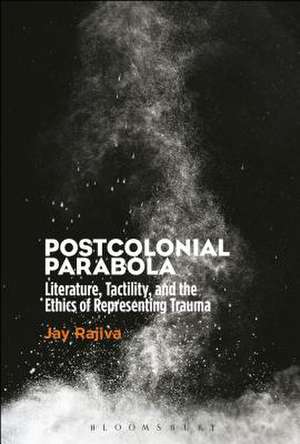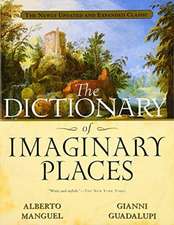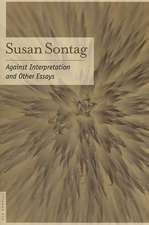Postcolonial Parabola: Literature, Tactility, and the Ethics of Representing Trauma
Autor Dr. Jay Rajivaen Limba Engleză Paperback – 20 mar 2019
| Toate formatele și edițiile | Preț | Express |
|---|---|---|
| Paperback (1) | 229.78 lei 6-8 săpt. | |
| Bloomsbury Publishing – 20 mar 2019 | 229.78 lei 6-8 săpt. | |
| Hardback (1) | 655.74 lei 6-8 săpt. | |
| Bloomsbury Publishing – 20 sep 2017 | 655.74 lei 6-8 săpt. |
Preț: 229.78 lei
Preț vechi: 296.55 lei
-23% Nou
Puncte Express: 345
Preț estimativ în valută:
43.97€ • 45.91$ • 36.39£
43.97€ • 45.91$ • 36.39£
Carte tipărită la comandă
Livrare economică 05-19 aprilie
Preluare comenzi: 021 569.72.76
Specificații
ISBN-13: 9781501351501
ISBN-10: 1501351508
Pagini: 224
Dimensiuni: 152 x 229 x 13 mm
Greutate: 0.3 kg
Editura: Bloomsbury Publishing
Colecția Bloomsbury Academic
Locul publicării:New York, United States
ISBN-10: 1501351508
Pagini: 224
Dimensiuni: 152 x 229 x 13 mm
Greutate: 0.3 kg
Editura: Bloomsbury Publishing
Colecția Bloomsbury Academic
Locul publicării:New York, United States
Caracteristici
Examines
literature
from
disparate
postcolonial
periods
(apartheid
and
post-apartheid
South
Africa,
the
partition
of
India,
and
the
Sri
Lankan
civil
war)
through
a
revealing
theoretical
framework
Notă biografică
Jay
Rajivais
Assistant
Professor
of
Global
Anglophone
Literature
at
Georgia
State
University,
USA.
Cuprins
AcknowledgmentsIntroduction:
Postcolonial
Comparison1.
Excess
and
Tactility:
Toward
Interpretation
as
Vexed
Contact2.
Transfixion
and
Subversion:
The
Unexpected
Endings
of
J.
Devi
and
Coetzee3.
Seduction
and
Substitution:
Behr,
Sidhwa,
and
the
Child
Narrator4.
Motion
and
Stillness:
Surface
as
Depth
in
Dangor
and
OndaatjeConclusion:
Postcolonial
RelationReferencesNotesIndex
Recenzii
This
is
an
intriguing
and
conceptually
ambitious
work.
An ample, philosophy-laced, and at the same time original analysis of postcolonial trauma literature, based on the juxtaposition of two distinct postcolonial histories: Indian Partition and South African apartheid ...Postcolonial Parabolais built on solid theoretical grounds leading to a complex and intriguing argument.
Jay Rajiva's illuminating and engaging book makes a valuable contribution to postcolonial trauma studies. It manages to stand out in this increasingly crowded field thanks to its novel methodology and fresh comparative approach, productively connecting narratives bearing witness to South Asian and South African historical tragedies through a sustained focus on the tactility of the encounter between reader and trauma text.
Postcolonial Parabolais a brave and important milestone in the ongoing attempt to read trauma beyond the Euro-American context of trauma studies. Its subtle, compelling and highly original readings show how, like the arc of a parabola, literary narratives from South Africa and the Indian subcontinent approach but never quite 'touch' traumatic experience. Drawing on the work of Derrida and Nancy, Rajiva takes the phenomenological account of embodiment to its own limit: the reader's experience of postcolonial trauma is necessarily prosthetic, haunted by a distance that it can never quite traverse. In showing how this distance is differently calibrated by the form that each narrative takes,Postcolonial Parabolais a masterfully measured exposition of precisely what it is that postcolonial literature can-and cannot-offer its readers.
An ample, philosophy-laced, and at the same time original analysis of postcolonial trauma literature, based on the juxtaposition of two distinct postcolonial histories: Indian Partition and South African apartheid ...Postcolonial Parabolais built on solid theoretical grounds leading to a complex and intriguing argument.
Jay Rajiva's illuminating and engaging book makes a valuable contribution to postcolonial trauma studies. It manages to stand out in this increasingly crowded field thanks to its novel methodology and fresh comparative approach, productively connecting narratives bearing witness to South Asian and South African historical tragedies through a sustained focus on the tactility of the encounter between reader and trauma text.
Postcolonial Parabolais a brave and important milestone in the ongoing attempt to read trauma beyond the Euro-American context of trauma studies. Its subtle, compelling and highly original readings show how, like the arc of a parabola, literary narratives from South Africa and the Indian subcontinent approach but never quite 'touch' traumatic experience. Drawing on the work of Derrida and Nancy, Rajiva takes the phenomenological account of embodiment to its own limit: the reader's experience of postcolonial trauma is necessarily prosthetic, haunted by a distance that it can never quite traverse. In showing how this distance is differently calibrated by the form that each narrative takes,Postcolonial Parabolais a masterfully measured exposition of precisely what it is that postcolonial literature can-and cannot-offer its readers.













